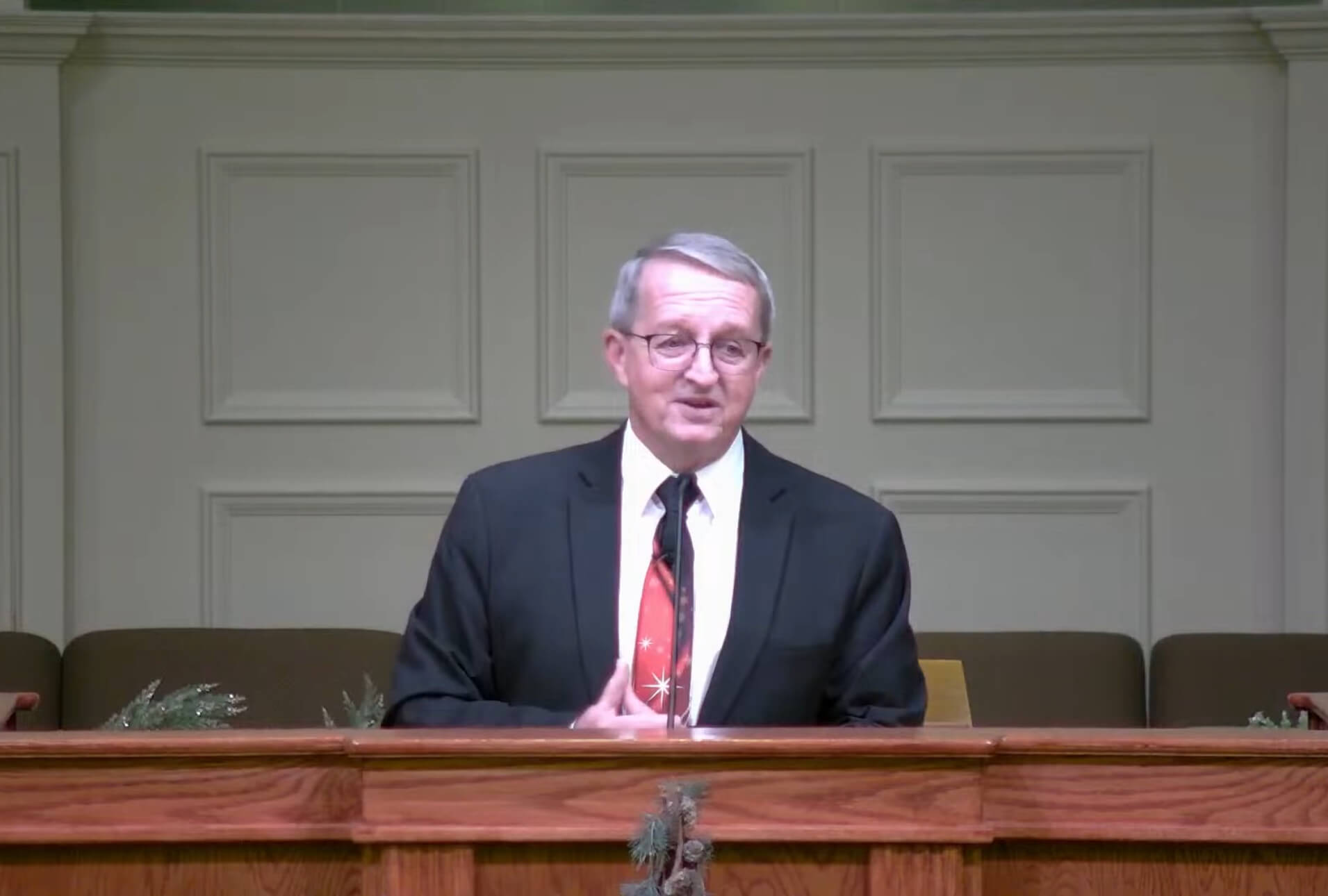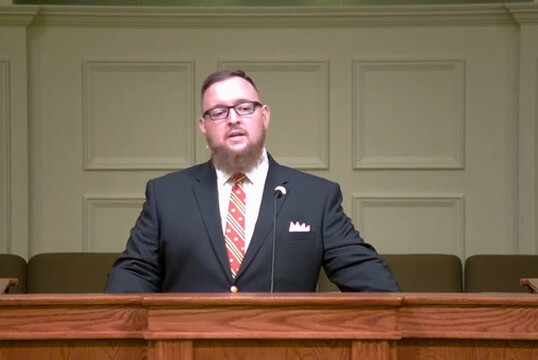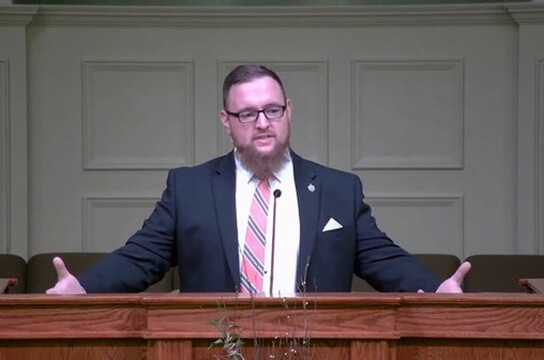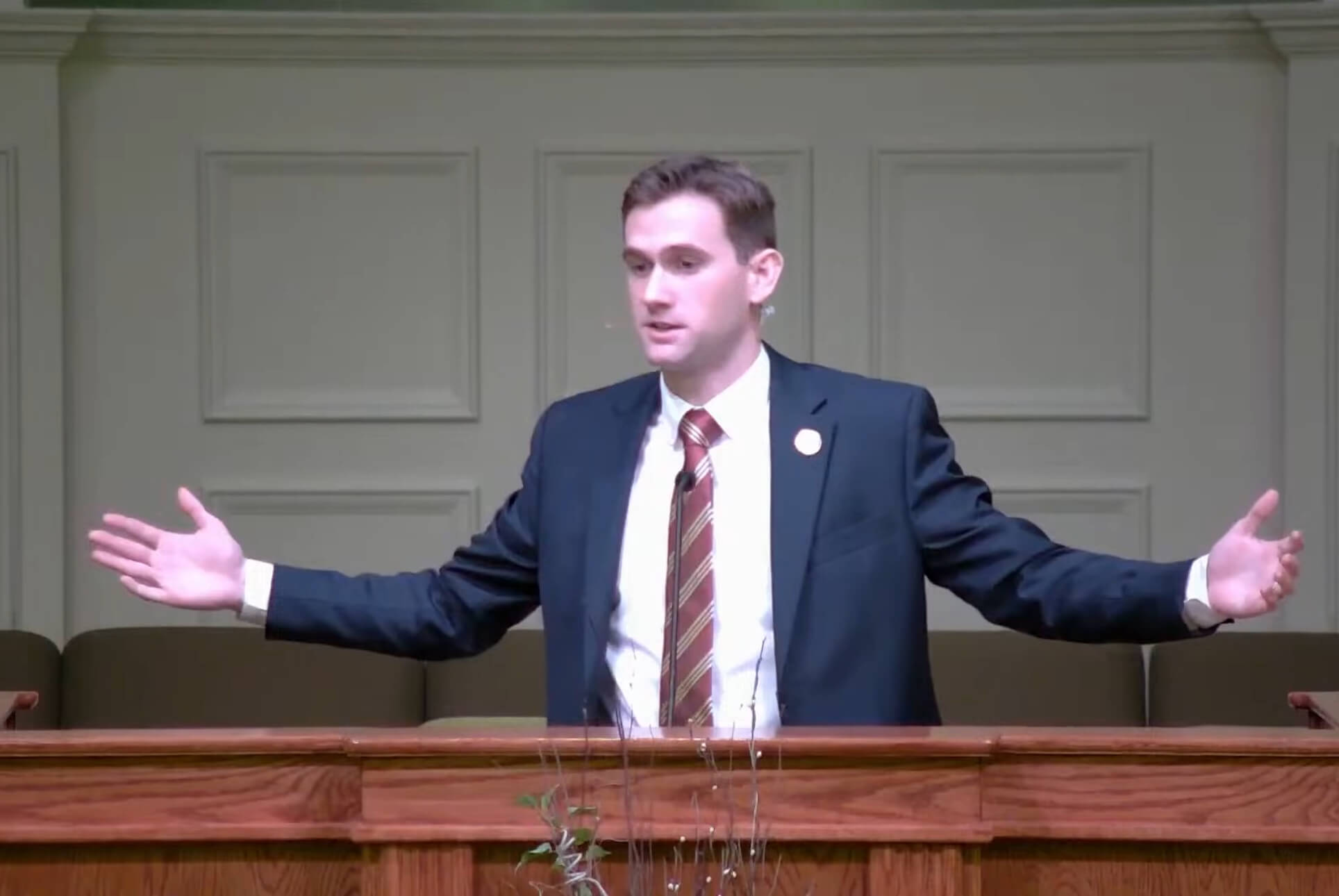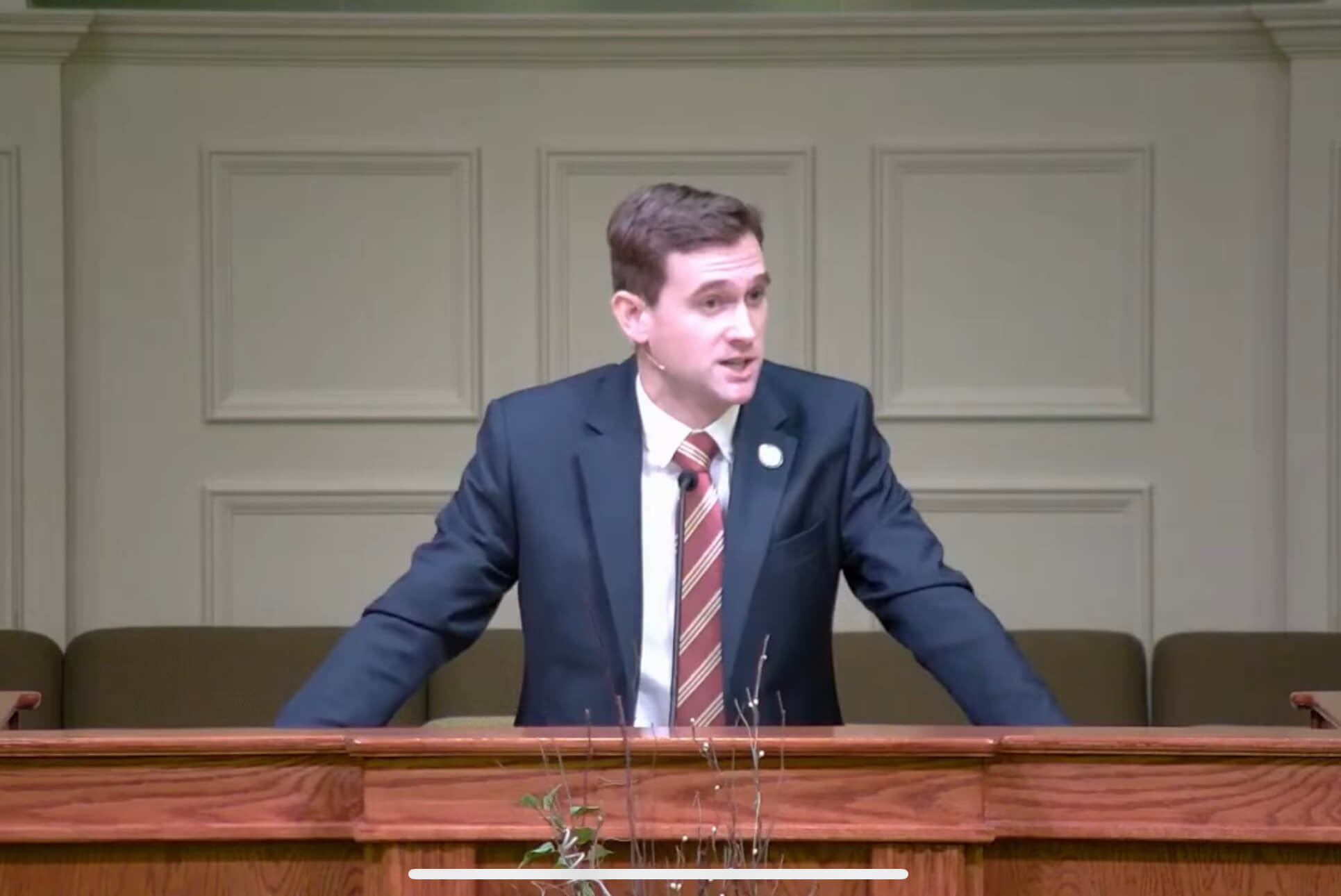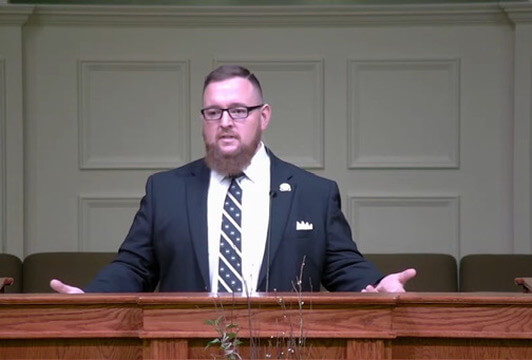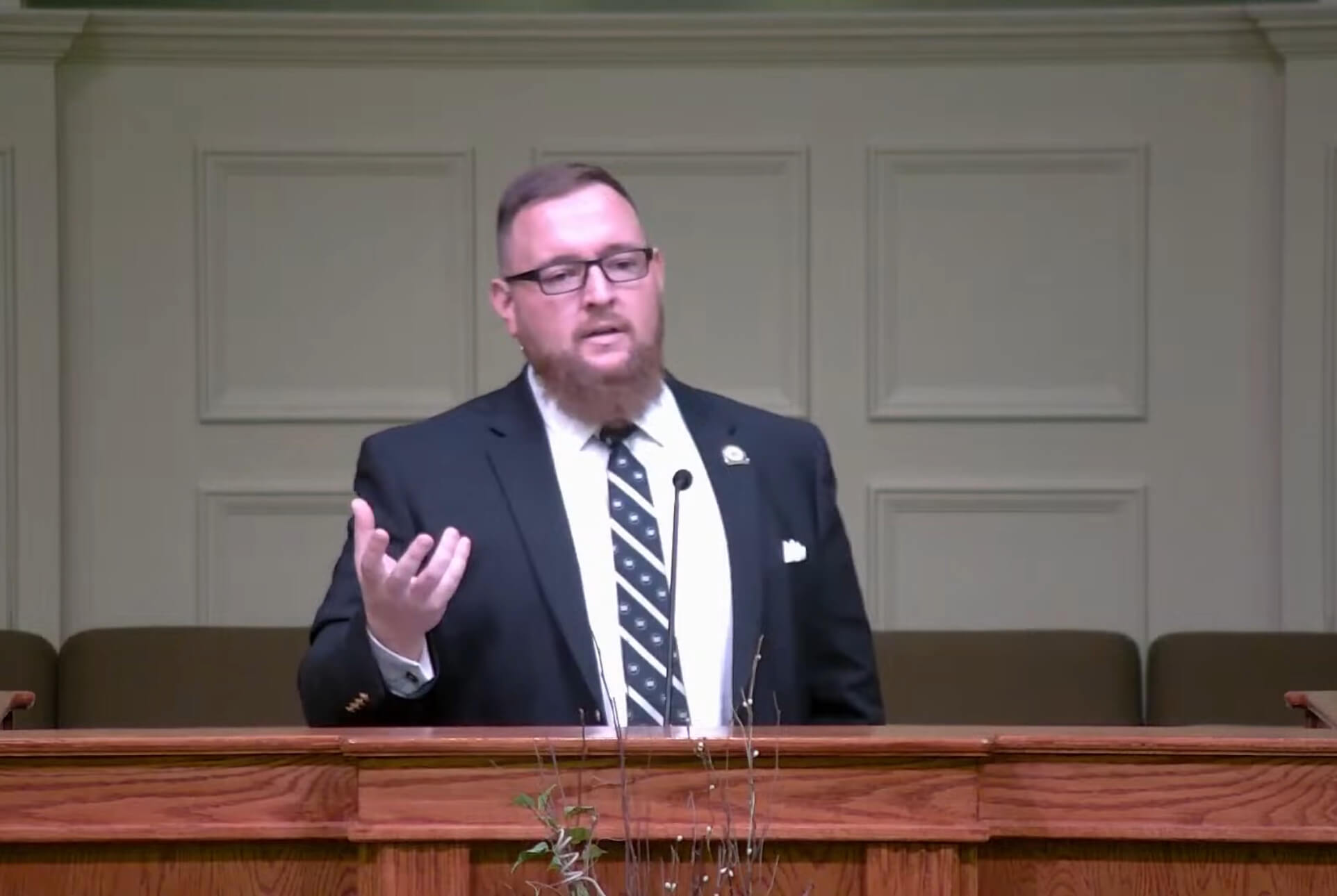Video
“Christmas Message 1994”
Philippians 2
Pastor Richard C. Piatt II
12/22/2024
Audio
Transcript
Well, would you please take with me and turn in your Bibles? Now we’ve been all over the place as far as the confession of faith and the places that were read and the call to worship. And now we’re gonna go to another one. And now I want you to turn to the book of Philippians. Philippians chapter two. Philippians chapter two.
Now, some may have wondered, and after 30 years, you know, I’m not a very good kind of person, a pastor, to come up with fancy sermon titles. So this one just, Christmas 1994. You might think, what on earth is that? Well, what that is, is Christmas 1994 was my first Christmas here. at Fellowship Baptist Church 30 years ago. And as we’re having in a sense some, I hesitate to use the word transition because people make fun of me if I say I’m transitioning. And so we’re not gonna say that this morning. And then to say the big switcheroo.
Well, then it makes us sound either too light or it makes you sound like a magician. And that in the church isn’t a very good kind of a thing. And so I don’t know what you want to call it. this idea that a change of title, now there’s one, a change of title coming that will not be the senior pastor, but I will be a pastor of congregational care, a staff pastor, you can call me pastor still and so forth, but some changes that are coming up, but probably my last Christmas message as a senior pastor, And so I thought, as you’ve heard throughout this month, that I kind of went back and was reflecting over what I was going to preach. Actually, I thought this was going to be preached last year.
I wasn’t quite up to it, having just had open heart surgery and almost died. So this one, I was kind of glad that we were able to keep it together physically and health wise so that I could still preach this particular message. Well, I thought I would go back and pull out my file and just take a look at the several messages over the 30 years of Christmas messages and thought I would take a look and say, OK, I wonder what I should preach. I thought at one point of having a panorama. In fact, that is actually written down in my calendar panorama Christmas message. But after 30 years, I thought, I think you still love me. But after 30 points. of giving each sermon, you know, a point in the message. You may not love me after that.
And so I thought, well, I don’t want to do that. Well, as I went through and did that and we’ve done some piecemeal and put some together and so forth, I came across and here it is, a handwritten message from 1994. And now I want you to know that I reworked it. I did spend a little bit more time because personally, I can’t pick up an old message and just preach it.
Now, that is called a disclaimer because the deacons are after me enough that they might cut my salary if they think I just pulled out a sermon and I’m going to preach it again without their saying, well, you know, you didn’t earn that that sermon. So it’s not exactly the same. I feel like, you know, I really got to say that it’s not exactly the same. But it is, it’s gonna have some marks of that first message in 1994. What was also kind of special is at the bottom of the page, it also had in the early 80s written at the bottom of it, which means it was also the first Christmas message at Wildwood Chapel, my first ministry. And so that’s kind of cool to see. And now as we’re kind of coming full circle and looking at this, It becomes important.
Now, having reviewed and gone through all those other messages, I found certain themes of things that I’ve done. Sometimes you come to a Christmas message, if you’re wanting to be a long-term pastor and you preach the Christmas messages over 30 years, you can’t just preach the same thing. And so over the years, we’ve done some unique sermons The one about Jesus and his circumcision. That had to be a unique one.
I have one that was entitled the pain of Christmas. And it was how that the Christmas time brings pain. And that had to deal with the fact of the babies that were murdered and so forth at that particular time. And so we’ve had what I would call in my thinking and in homiletics The specialty sermons topical special special sermons that are very unique. Then of course there have been those that have been from the text and I’ve tried to be faithful to the text of scripture and we’ve actually preached one message. It was on. the ancestry of Jesus and the two, well, technically, the ancestry lineage of the Savior, even looking at the Gospel of John when it goes all the way back that he preceded all of creation and it was God and is God.
We went through going back to King David, going back another one all the way to Adam and that he was the promised Messiah and that his lineage or his ancestry shows us why he was qualified to become the savior. The Jewish mind and the mindset that was a big deal. It’s also a big deal because of how it was prophesied that God would send one and his name would be Emmanuel, God with us. Well, you got to follow the lineage. And so we’ve taken a look at that. There have been other years that I have mentioned sermons concerning Christmas and the war on Christmas. And that has been probably a little bit more recent over the years of the last 10 years.
There’s been a couple of messages over the war of Christmas. And one of those even kind of got me in trouble, not here. I was in another church that I preached and I made the comment that Jesus Christ, the son of God and God, the father, do not share their glory with anyone, including Santa Claus. And boy, I had a mother come up to me after that message who was hot. And she just was angry that I would say anything in a negative way about Santa Claus. But let me tell you, Santa Claus and the stories that we tell and the traditions and some want to share that with their kids and others not and how all of that plays out. But my statement stands. God does not share his glory with anyone. And that’s the one dangerous thing that we have to worry about when pagans and when others even take traditions and they overemphasize because we wrestle not against flesh and blood, but against principalities and powers against spiritual wickedness in high places. And we got to be careful that we don’t lose that.
There was one of my in one of my files As I was going through them and looking at that, I have a picture and it has a man who’s sitting down with his long list of Christmas presents with his hand in his and his chin in his hand. And he’s thinking and he’s saying, what have I forgotten? And there’s a picture of Santa Claus and everything around. And then there’s this picture of the heavenly gate and a picture of Christ saying me. You don’t want to forget what this is really all about. And so the war on Christmas, there can be the war on Christmas in so many ways. And then that bled over into another area. And that’s where we’re going to go on a section that I’ve had other messages like this. And it is the idea, but it has to do with the war on Christmas. And that and that comes back to what Christmas is really all about the heart of Christmas. And that is it’s about Jesus Christ, the son of God. And anything that takes away from that is an infringement upon what this whole thing is about. And we must guard ourselves against that. He is the one that Christmas is about. And so we’ve had a series of sermons over the years over the theology of Christmas.
Now, one of the kind of interesting things that you can get when now that the Internet, a more recent development in sermon development, and no, this did not come from AI or whatever that thing is. I don’t even know how to get to that point after those poems that were given to me and get poems and AIs and sermons and all this kind of thing. But with the internet and with searches, but if you talk about the theology of Christmas, I found it was a man who actually put together a series of mini sermons and the whole thing was only about like four minutes. of Paul Washer, of John MacArthur, of R.C. Sproul, and Votibakam. Now those are pretty big hitters, and some really nice, but they all came back to the same thing. And I love Votibakam the best, because he’s just so, it’s about Jesus Christ. God, who is eternal spirit, clothed, in the words of R.C. now, in flesh, so that he could die, so that we can live.
Now that’s Christmas. What difference does it make what is in that present under the tree when you have a statement like that? The theology of Christmas. Well, that’s what I want us to take a look at today. I have you in Philippians chapter two, but I’m gonna quote because we’re gonna take a concept and then look at the theology of it in a very unique way, but from this text. In the beginning, now that sounds like I could be in either Genesis or the Gospel of John. But now you’re gonna know where I’m at. In the beginning was the Word. Okay, that’s cool. Word, it’s not identified yet in the text there. In the beginning was the Word. And the Word was with God, face to face. So it’s distinctive, but face-to-face, and that’s gonna be important in the theology of Christmas, was face-to-face with God, but so that you get it, in the beginning was the Word, and the Word was with God, and the Word was God.
Now my mentor in R.C. Sproul is big on the being verb. Is, was, and it has to do with being, the beingness. God is. He never began, he never is not or was not. He always is, was, has been, he is. And so all of this began and the word was God. When the word was there with God in the beginning, he was God, but he was face to face with God. That’s important. Now, we still need to identify who the word is. Well, you find that in verse 14 of the Gospel of John, chapter one and the word. This. Is one of the most. profound statements ever. And the word became flesh. Now that points to the incarnation. That points to a virgin conception as further revealed in the Gospel of Luke and so forth as we study. You gotta have theology to be able to get that. It is profound to me in thinking that people think one doctrine is boring or that they don’t want doctrine, they just want Jesus. They just want relationships. I want truth. Absolute, unvarnished, real truth. God put on flesh.
Now that’s gonna be the key thought. That’s my thesis statement for the theology that we’re gonna be looking at in our doctrine of Christology. The incarnation, who Jesus was, became, is, and will be. And how profound all of that is. And let me just start off by telling you, this is always dangerous in public speaking, but truly born again saved believers, they get it. I’m not even gonna scratch the surface, and I may not even be, I’m gonna do my best to be as theologically accurate as possible, but I may make some heretical statements, or at least you’re gonna think they’re heretical, until I back them up with scripture. Because we’re looking at something, that is so profound, you’ve got to take two steps back and as you look at it, there are consequences and the impact out beyond what you could ever see. Or we could look at it under a microscope and as you go down and you look at the little tiny details of all of it all, There’s even more details behind that. This can never be exhausted.
But today what I want us to do is to be able to leave with a sense of awe and awesomeness of our God putting on, clothing himself, with flesh. And what on earth does that mean? Theologians have grappled with that in so many places. Well, it’s there in the Gospel of John, chapter one. But I want us to come to Philippians, chapter two, because we have this here also. And this is, we read this and we sometimes come to it with preconceived ideas. We come to it with presuppositions of we know where it’s going to end up and we want to leave it. And we sometimes miss the forest, or we see the forest, but we miss the trees. It’s kind of like the time I got glasses in seminary, first time. And I put them on and I go, wow, those trees have leaves on them. Well, they’ve always had leaves. I just now could see them. But we sometimes have a hard time seeing the forest and the trees. But look at Philippians chapter two, a very common passage. But let’s look at it very carefully, and I’ll read it in its entirety, verses five through 13, and then we’re gonna come back and do a threefold division of this passage.
Hear the word of God. Let this mind be in you, which was also in Christ Jesus, who, so this is talking about Christ Jesus, being in the form of God, did not consider it robbery to be equal with God, but made of himself of no reputation, taking the form of a bondservant and coming in the likeness of men and being found in appearance as a man, he humbled himself. and became obedient to the point of death, even the death of the cross. Therefore, God also has highly exalted him and given him a name which is above every name, that at the name of Jesus, every knee should bow of those in heaven and those on earth and those under the earth, and that every tongue should confess that Jesus Christ is Lord to the glory of God the Father. Therefore, my beloved, as you have always obeyed, not as in my presence only, but much more in my absence, work out your own salvation with fear and trembling. For it is God who works in you, both to will and to do for his good pleasure. May God bless this passage of scripture, even in its reading.
Well, this passage, if you saw some things in there, it breaks itself down into two sections, which also help us to properly get the right doctrine of our Christology. And that is, who is Jesus Christ? Well, number one in the war against Christian and Christianity and the war against Christ and the war against Christmas. There are those who do not believe the first statement and that is this Jesus is God. Secondly, the second point in this passage Jesus is man. He is truly God truly man. Fully God, fully man, depends upon what theologian you want to go with. And it’s fun to watch R.C. and John MacArthur and different ones debate all these things. But you know, and R.C., that they, those all stand and they’re real. He is 100% God. The deity of Christ, we take a bullet for. but he’s also fully man.
We need to be able to take a bullet for that, though we may not feel it as strongly, but it’s absolutely important if our salvation is gonna be real. He’s tempted in every way such as what we are, and yet without sin. God does not have blood, God is spirit. God does not have flesh, because he’s spirit. And Jesus said you can’t have eternal life unless you eat my flesh and drink my blood. Now we understand the symbolism and that symbolism we’ll take care of tonight with communion. But be that as it may, you can’t die if you don’t have a body. God cannot die. R.C.’ ‘s criticism of And Can It Be is real, although we get it with artistic license, that thou my God shouldst die for me. God dies. All that exists ceases. Because God cannot die. He’s the one by him all things consist. If he’s gone, it’s over. It may have never been.
You see, because of who God is. But Jesus is God. Jesus did die. What happened? You don’t have any of this if you don’t have God. Becoming man. Clothed in humanity, clothed with skin cells and a liver and digestive system at all. You don’t have real salvation available if Jesus is not God. You don’t have salvation if he’s not man. So the way you keep it straight is Jesus is God, Jesus is man and we gotta talk about that and how that comes together and this text does. And then, just to have a good sermon, and in the writings of the Apostle Paul here, he then goes on and says, so what? What does that mean now? So that’s the three points of this sermon’s message, that Jesus is God, Jesus is man, and so what? Why is all of this important? Why is Christmas so important? Well, let’s just quickly take a look at this. Jesus is God.
Now through the years you’ve heard enough many sermons from me and I love to preach about Christ and this sort of thing. And so we don’t need to spend a lot of time here. But look at this. Let this mind be in you which was also in Christ Jesus who. So there again a positional statement. Jesus Christ is this is one who more time who being in the form of God. Well, what form is God in? Well, you know, if we need since we can’t figure that out ourselves, it has to be revealed to us. And Jesus is actually the one who revealed it. God is spirit. Those that worship him must worship him in spirit and in truth. And so he that is Jesus Christ being in the form of God. Okay, he is eternal spirit.
Now we begin to understand a little bit John 1.1. In the beginning was the word and the word was God and so forth. You know, you got in the beginning was the word, the word’s worth God and the word was God. There was God. Before there was anything, anything material, anything, there’s God. God is spirit. The word is there. And even in verse 14, and the word, Became flesh. Jesus is not an eternal fleshly being, which by the way, ought to just really knock your socks off. Theologically, at least speaking. He wasn’t flesh, he became flesh. He was clothed in flesh. That is exactly what verse 14 there in John 1 refers to. Yeah, John 1 in verse 14. And yet our God is unchangeable. He’s immutable, theologians would say. He changes not.
So somehow, in the profound wisdom, power, sovereignty, greatness of Almighty God, how do you become from Spirit to flesh without changing. Honestly, I don’t have the slightest idea. I just know Jesus did. Because that’s what the scriptures claim. But he goes on and he gives us some hints. Being in the form of God did not consider it robbery. Well, you know, if you’re gonna be a robber, there are several ways. Some people, it’s an old King James expression, but it means not something to be grasped. A robber is a grabber. We’ve seen this break in and crash and grab and get out kind of a thing. So it isn’t something to hurry up and get a hold of. Jesus did not consider it robbery, something to be grasped, to be equal with God. He was God. He’s equal with God because he is God.
We have that pre-incarnate existence of the Lord Jesus Christ. Jesus did not begin with the Holy Spirit placing Jesus within the womb of Mary. That’s not the beginning of Jesus. John doesn’t allow that. We’ve got the angel of the Lord in the Old Testament. Those Christophanies and the appearance of one that would be what some would refer to as Theophanies, but the God that is represented there would have been Christ himself. And so you’ve got these Jesus Christ existed before his conception. Not true of us, but it was true of him because he’s God, he’s eternal. He has all of the attributes, all of the things that is true of God, Jesus Christ had. He was equal with God. And then another profound word, but. But what? But he made himself of no reputation and taking.
Now this brings up the word of a change. There was somehow a change, something that happened. But made himself no reputation, taking the form of a bondservant, a slave. That’s just the word slave. Is God the slave to anyone? No. Was Jesus? Yeah. He became, taking the form of a slave. But notice, and coming in the likeness of men. That is, he took a form. He took on flesh. So when we talk about there is the divine nature and the human nature, and that Christ was not a duplicity, he’s one being, but a being, and again, here’s where things get really, according to theology definitions and all that, a man with two natures, he was God and he was man, and here, but he had the form and likeness of a man, And he goes on to say in verse eight, and being found in the appearance of a man.
Now that just goes through all kinds of church heresy that has been preached over the years that Jesus wasn’t real, he was only a phantom. Or that if he would have gone up, it would have gone on. Or he became God at his baptism. But when he, right before he died, the God part of him left. Now the appearance, and he being found in the appearance of a man. But here it comes, he humbled. For us to be able to celebrate Christmas involved the humbling of the second person of the triune God. So wrap your head around that one. What do you do with that? I don’t have the slightest idea. I just know it’s true. He humbled himself. He could have come in and I’ve had in the sermons over the years you know this thing about Yeah, he was, you know, humble in his birth and laid in a manger. But when I was born, I didn’t get a bunch of angels to announce my birth. And so there was the regal aspect of it. And nobody came and visited my mom and dad and brought gold, frankincense, and myrrh. I don’t know what they would have done with the last two, but the gold would have been nice, especially back in the 50s, 1950s. That would have really set my parents off a little bit better. So there were those regal aspects, but he was a man. And he humbled himself. How does that humbling take place and what it is?
Well, OK, so now what we have is that Jesus is God. He’s in the form of God. He is equal with God. But secondly, now Jesus is man. Well, we know that and we know the circumstances of the Christmas story, Luke chapters one and two. But he was made or he emptied himself. Some have put it this way even in the John MacArthur study Bible it says there was self renunciation. I don’t know that I like that phrase. It sounds like he’s trying to deny part of himself. Some refer to this as part of what’s called the kenosis theory. He set aside the independent exercise of his divine attributes, saying basically that Jesus Christ possessed everything and was what God is. He just didn’t access it. And there were times that it broke through, such as in the transfiguration, such as when he said to Nathaniel, when you were under the tree, I saw you. And he had this omniscience and that sort of thing. Because when we think of God, we think of God being omnipresent.
Well, you could see Jesus. Now could Jesus know? And in seminary, there was always this discussion. When Jesus walked the earth, did he know how many anteaters there were in South America? Well, I don’t know that the son of God really worried about how many anteaters there were. Now, did he and his human nature? No, because he grew in wisdom, both in stature and in favor with God and man. Now, how does the son of God do that? But yet he was still his father. That’s why you need to have the human nature, He grew. He added cells to his body. He didn’t stay a baby, praise God. He grew physically. Does God grow physically? Well, God’s not physical. And so you see, that is how we begin to be awestruck.
Who is this Jesus? He is God, fully God, truly God. And he is man. Fully man, truly man, yet one. That’s our savior. Clothing, he was clothed in flesh, the incarnation. He took upon himself the form of a slave. In the likeness of men, the appearance of men, with humility and obedience, he had that. Now for that 1994 message, In the incarnation, there were what was called five changes or at least five changes that we’re going to point out today. There was a change. In his dwelling place, in the incarnation, taking on the form of a servant, there was a change in his dwelling place. That it did not begin with Bethlehem, that was a door of entrance to the God man. In the gospel of John, chapter six and verse fifty one. We don’t think of it in this in this in this vein, but we need to. John six fifty one. I am the living bread. That came down from heaven. Where was he before the conception? He was in heaven.
The son of God, who was in complete, perfect communion with the Father and the Spirit, the Spirit with the Son and the Father, and the Father with the Son and the Holy Spirit. And that perfect existence before anything was, he spoke Genesis 1, creates everything. Jesus and the Holy Spirit were there. But, after 400 years of silence, and then the angel Gabriel talks to Mary, that holy thing, that is going to be conceived in you is going to be called the Son of God. You call him Jesus. He’s going to save his people from their sin and he’s still doing it. And in the midst of all of that, he came down, the bread of heaven. That’s why we read that passage in John six about that he is the bread of heaven. He came down from heaven. And if you don’t eat and drink, and if you don’t recognize the fact that he is the one to whom provides eternal life, you can’t be saved. So there’s a change in his dwelling place. Have you eaten? that bread, and have you drank of his blood? Has the blood of Christ washed away your sin? Well, first of all, it couldn’t have if Mary wouldn’t have conceived him in a virgin conception.
Secondly, there was a change in his possessions. He went from riches to poverty. We will never fully know. For that span of time, This is actually in my theological mindset. I just wondered God who is eternal and time means nothing became the God man and he tied himself to about 33 years. He entered the time space continuum. But it was more than that. He left eternity. To lock himself into time again for a while. Not only that, he went from riches to poverty. Luke chapter nine and verse 58. Foxes have holes, birds have nests. And I have a rock put my head on. That’s a pie of free translation. The son of the eternal God who speaks and galaxies come into existence. Doesn’t have a pillow. My pillow man hasn’t developed his business yet. Has nothing. He gave it up. Second Corinthians chapter eight and verse nine, for your sakes, he became poor. He became something that he wasn’t. Now, how do you put that into an eternal son of God who is God? You can only do it because he’s also man. You must get that right.
So there’s a change in his dwelling place, there’s a change in his possession, there’s a change, and this one’s even more profound, in his glory. He went from glory having the most beautiful of all of creation things that can be in angels, seraphim, cherubim, and all that. He left all of that glory and all of that beauty to come down to be born of Mary and Joseph. to have to ride a donkey in utero to Bethlehem, and then be born laid in a manger, then be yanked off to Egypt, and then come back, and then have a bunch of babies killed in the midst of all that, trying to kill you. And all those things that are part of the whole story and the narrative of the nativity. He left all of that glory John talked about that glory in First John, and we beheld him as of the glory of the glory only of the begotten of the father, full of grace and truth. He left that. To be born. And to place himself in a home and to have his parents come and go searching for him when he’s in the temple. When he was here in this world, He was not, he came into his own, his own received him not. But the one that just is profound, and we’re going to go here in just a moment.
John, Chapter 17, the high holy priestly prayer of our wonderful Savior. Right before his crucifixion. And Jesus says these words, Father. Restore, restore. I had it. I gave it up. Now I’m asking for it again. Restore unto me the glory that I had with you before the world was. That predates John 1.1. He had glory. And he set it aside. I am the Lord, I change not, therefore ye sons of Jacob are not consumed. I have to confess, it seems to me that was a change. Somehow, because of him being the God-man, that verse stands and the fact that he is immutable and he set aside his glory so that he could come and be my savior. and to be your savior, to be laid in a manger. He changed in his position. He was equal with God to servanthood. Philippians took upon him the form of a servant. Hebrews chapter five, verse eight, he, and this is just bizarre, learned obedience. In the garden, he prayed again, Father, not my will, your will be done. He learned obedience to the Father, realizing even to the extent of having the sin of the world to be placed upon him.
There was a change in his form. He went from spirit to flesh, from preexistent, holy, and unexplainable spirit to unfathomable expanses to being limited. to the ancient Near East and Palestine to walk on land. Unexplainable, unfathomable. How does pure spirit take on full permanent body? Now in the midst of all of that and the wonder of it all, Jesus is God, Jesus is man, and in those five changes, the change of his dwelling place, place, his possessions, his glory, his position, his form. All of those were restored when he rose from the dead. Except. One. My savior has now a glorified body. And he promises me one also. and I’ll get one just like his. So that is the beginning now of the third point. So what? What does all of this mean and what difference does it make? Well, we got to go back to Philippians chapter 2.
You see in this particular passage, there were two therefores. The first therefore is found in verse 9. And when it says they became obedient to the point of death, even the death of the cross, you can’t die if you’re pure of spirit. But a God man could die. The God man did die. So what? Well, therefore, it’s a big therefore. Therefore, God also has highly exalted him. It wasn’t just to get Jesus here to be a good example. The liberal churches believe that and they make me want to gag and upchuck. I’ll kind of clean that up a little bit. That’s not as bad. To create the need for an emesis space. Because you know what? That’s not enough. He didn’t come to just give us a good example. He’s not just another prophet. That’s why in the Gospels, we just keep saying, they kept saying, oh, you know, which prophet are you and what? Hey, in the words of John the Baptist, behold the Lamb of God, which takes away the sin of the world. No other prophet could do that. He could. Therefore, God has also highly exalted him.
Well, how? He’s given him a name. He’s given him the name which is above every name. At that name, every knee should bow. Of those in heaven, those on earth, and those under the earth, and that every tongue confess that Jesus Christ is Lord to the glory of the Father. Who is he? He is the one that God exalted. He’s exalted him in many ways, but I think at the end of the Gospel of Matthew, all authority is given in me and heaven and earth. Go ye therefore, and you make disciples, you baptize those disciples, and you lead them into all truth, the Great Commission. And so you see the first thing is, who is he? And now the second therefore kicks in. What does that mean, so what, for us?
Because notice he just has another therefore in verse 12. Therefore my beloved, you loved ones, the ones to whom he’s writing, as you have always obeyed, not in my presence only, but now much more in my absence, work out your own salvation or have a salvation that works with fear and trembling. For it is God who works in you both to will and to do for his good pleasure. So what’s the big deal? A young Jewish girl gives birth to a baby. How does that have any significance in 2024 and soon to be 2025? What difference does that make? So what? Well, it’s big because, and it ought to strike a tone of fear in you, with fear and trembling, because God has entered the time-space continuum with his son, clothing him in flesh, so he could kill him, so that then he’d be raised from the dead and make his blood a toning sacrifice. to save those who cannot save themselves.
There is no other name given among men whereby we must be saved. It’s at the name of Christ Jesus, our Lord. Paul wrote it in Romans chapter 10, verses nine and 10. We confess with our mouth and believe in our heart. Believe on the Lord Jesus Christ and thou shalt be saved. Commit your life unto him. So what about this little baby?
Well, without that little baby, we have no one to bow to. We have no one to confess. We have no one to glorify. We have no one to work for. We have no one to fear. We have no one to please. He mentions all of those in that. What about your tongue? Have you confessed him as your Lord and Savior? What about your life? Are you living to glorify him and to please him? With Mary, let’s ponder these things in our heart. With every thought captive. to the Lord Jesus Christ, the God-man. May he be our vision this Christmas.
Let’s pray. Our Father in heaven, what a story, what truth, what reality, Father, that you have revealed You did not leave us alone in our sin, but You allow us to look by faith to Him. Father, thank You for the unspeakable gift. Your Son, our Savior, all for Your glory, may we view Him in his richness, in his wonder, and may we stand in awe of the Lord Jesus Christ, a name that you have exalted. May we do so today as well as we pray this in his name. Amen.
